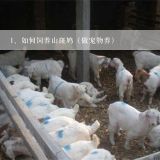河南农村养殖业对当地生态环境的影响如何?

Answer:
Negative Impacts:
- Habitat destruction: Farms can clear large areas of land for grazing, reducing the availability of habitat for other species.
- Water pollution: Agricultural runoff containing fertilizers, pesticides, and other chemicals can pollute nearby water sources, harming aquatic life and human health.
- Air pollution: Livestock waste and agricultural activities can release harmful pollutants into the air, contributing to respiratory problems and climate change.
- Soil degradation: Overgrazing and improper farming practices can lead to soil erosion, nutrient depletion, and loss of fertility.
- Disruption of ecosystem balance: Intensive farming practices can disrupt the natural balance of ecosystems, leading to the decline of beneficial insects and plants.
Positive Impacts:
- Food security: Rural farming can provide a reliable source of food for local communities and export to nearby markets.
- Economic benefits: Livestock and agricultural products can generate income and employment opportunities for farmers and rural residents.
- Cultural heritage: Traditional farming practices and knowledge can be preserved and promoted through agricultural tourism.
Overall Impact:
The impact of rural farming on the local ecosystem is complex and depends on various factors such as land use, management practices, and environmental conditions. While it can have negative impacts, such as habitat destruction and water pollution, it also provides essential resources for the local population and contributes to food security.
Additional Considerations:
- The impact of farming on the environment can vary depending on the type of livestock raised, farming practices employed, and the surrounding ecosystem.
- Sustainable farming practices, such as crop rotation, organic farming, and water conservation, can minimize negative impacts while still meeting food demands.
- Collaboration between farmers, scientists, and policymakers is crucial for balancing the need for agricultural production with the protection of the environment.





































































